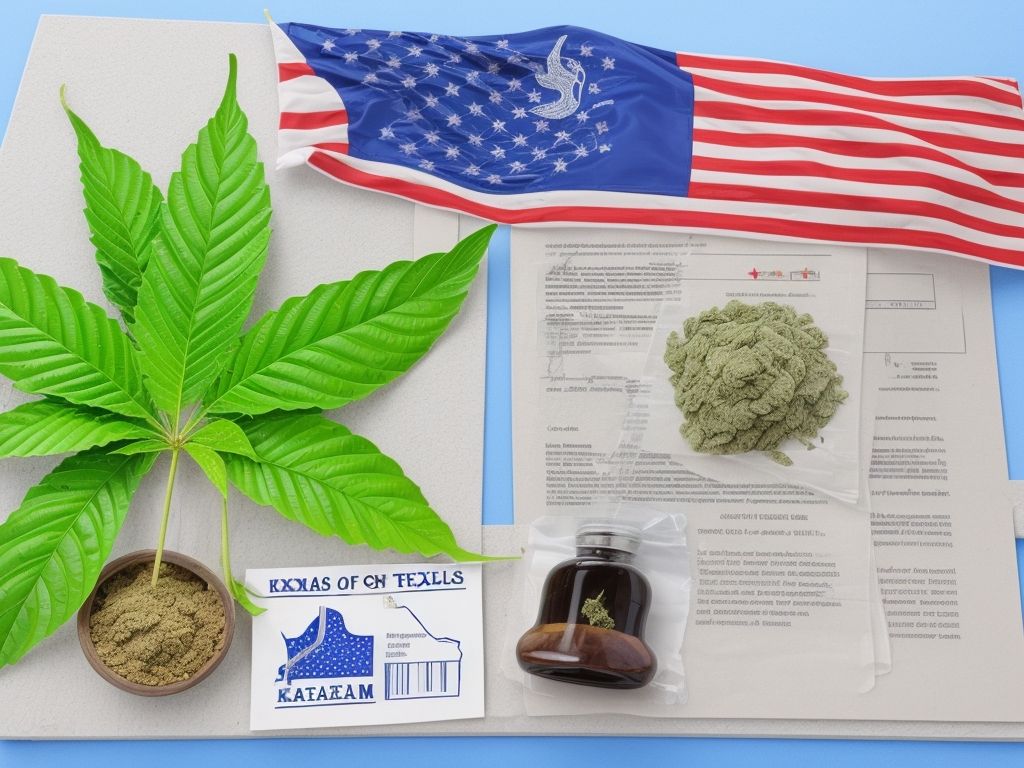Is Kratom Legal in Texas? Know the Current Status and Regulations
Kratom is a substance that has become popular in recent years due to its potential medicinal uses. This has caused debates on its legality, especially in Texas. People want to know if it is legal there. This article will explore the legal status of kratom in Texas.
Kratom comes from leaves of Mitragyna speciosa trees native to Southeast Asia. It has been used for centuries for its stimulant and analgesic properties. It is usually consumed as a tea or in capsule form.
Kratom is not a controlled substance at the federal level. However, some states have their own rules on its use and distribution. In Texas, kratom is legal for people over 18. Local municipalities may also have restrictions, so it is best to check with authorities before buying or using it.
In 2016, the United States Drug Enforcement Administration (DEA) wanted to classify it as a Schedule I substance. This was due to worries about misuse and addiction. But, after public outcry, pressure from lawmakers and advocacy groups showing its benefits, the DEA decided against this.
Many states have taken their own actions on kratom. Some have banned it, while others have put age restrictions or labeling requirements on products with kratom. The legal situation continues to change as more research is done on its benefits and risks.
Background on Kratom
Kratom stems from Southeast Asia. Recently, it has grown in fame as it could possibly have medicinal advantages. It is made up of alkaloids that connect with the body’s opioid receptors, causing consequences alike to opioids but with less danger of respiratory depression.
People use kratom to get rid of pain, decrease anxiety, and as a natural option to opioids. Some users also say that it lifts moods and helps focus, which makes it attractive to those searching for more energy or productivity. Nevertheless, there is still a lot of discussion about its safety and potential risks, as studies around kratom are limited.
Legally, kratom’s standing changes in the United States from state to state. Even though it is still legal federally, some states have prohibited its possession or sale. Texas has not yet banned kratom.
The Food and Drug Administration (FDA) has expressed worries about kratom’s safety and abuse potential. They have notified people about contamination in kratom items and suggest not using them owing to health hazards.
In conclusion, while kratom is still legal in Texas, it’s essential to inform yourself on potential risks and benefits prior to considering using it. It’s always sensible to speak to healthcare professionals for tailored advice on any substance consumption.
Current Legal Status of Kratom in the United States
The legality of kratom in the U.S. is an important topic to grasp. We’ll review the current state of affairs.
Kratom’s legal status varies from state to state. Here is a table to illustrate:
| State | Legal Status |
|---|---|
| Alabama | Illegal |
| Arkansas | Illegal |
| California | Legal |
| Florida | Legal |
| Texas | Legal |
Texas is one of the states where kratom is still legal. However, local regulations may still apply.
Lawmakers and regulatory bodies are assessing potential risks and benefits linked to kratom use. This is to ensure safety and address public worries.
Let’s look at Mary, a resident of Texas, who was looking for an alternative to manage chronic pain. With research and advice from healthcare professionals, she found relief in kratom. Mary’s story shows how people can benefit from kratom when used responsibly and legally.
Is Kratom Legal in Texas?
Kratom’s legal status in Texas is a subject of debate. As of now, it is legal for individuals to possess and use kratom in Texas. However, there are ongoing discussions regarding the regulation and potential banning of kratom in the state. It is important for users to stay updated on any changes in the laws and regulations surrounding kratom in Texas to ensure compliance. The future of kratom in Texas remains uncertain, and individuals should stay informed to avoid potential legal issues. Stay tuned for updates on the legality of kratom in Texas.
Texas tried to ban kratom once, but let’s just say it was a Tex-ass decision.
Previous Attempts to Ban Kratom in Texas
Attempts to ban kratom in Texas have been met with opposition and debate. People say it has medicinal value, while others are worried about abuse and addiction. Here’s a look at the attempts to ban kratom in the state.
| Year | Bill Number | Outcome |
|---|---|---|
| 2015 | HB 3782 | Failed |
| 2019 | SB 1147 | Failed |
| 2021 | HB 2063 | Pending |
The Texas Department of State Health Services looked into it, listening to different sides. In 2017, a hearing was held by the House Public Health Committee to talk about kratom being a controlled substance. Different experts, supporters, and citizens showed their views for and against the ban.
Debates continue about kratom’s legality. All sides should talk and think about the science when deciding about public health and safety.
Current Laws and Regulations
Kratom’s legal status in Texas is a bit of a confusing story. House Bill 151 was given the go-ahead, legalizing possession and use. Sadly, Senate Bill 1575 didn’t make the cut, which was aiming to ban Kratom. Meanwhile, House Bill 4631 is still in progress, suggesting stricter regulations on Kratom sales. So, if you’re in Texas, stay informed of the latest Kratom laws to ensure you’re compliant!
Arguments for and against Kratom Legalization in Texas
Arguments for and against the legalization of Kratom in Texas can be analyzed from various perspectives. Here are some key points to consider:
A table presenting the arguments for and against Kratom legalization in Texas:
| Arguments for Kratom Legalization | Arguments against Kratom Legalization |
|---|---|
| 1. Potential medicinal benefits | 1. Lack of regulation and quality control |
| 2. Natural and plant-based substance | 2. Risk of addiction and abuse |
| 3. Possible alternative to opioids | 3. Limited scientific research and evidence |
| 4. Economic opportunities | 4. Safety concerns for public health |
These arguments shed light on the ongoing debate surrounding the legality of Kratom in Texas. While proponents emphasize its potential medicinal benefits, natural origin, and economic advantages, opponents raise concerns about the lack of regulation, addiction risks, limited research, and potential public health hazards.
In addition to the arguments above, one unique aspect to consider is the cultural significance of Kratom among certain communities. This aspect deserves attention as it connects the discussion with the cultural diversity of Texas and the importance of acknowledging diverse perspectives when making legal decisions.
To illustrate the impact of Kratom, consider the story of John, a Vietnam War veteran living in Texas. John, plagued by chronic pain and struggling with opioid dependency, turned to Kratom as a potential alternative. With careful use and guidance, John found relief from pain and successfully weaned off opioids. This remarkable personal experience serves as an example of how Kratom can positively affect the lives of individuals in need.
Understanding the multifaceted arguments for and against Kratom legalization in Texas is crucial for policymakers and citizens alike. By considering the potential benefits, risks, and unique stories like John’s, an informed and balanced decision can be reached concerning Kratom’s legal status in the state.
Unlock the secret benefits of kratom, but don’t forget to check your local laws before diving in – legality can be a real buzzkill!
Benefits of Kratom
Kratom, a herbal supplement surrounded by controversy, has been heavily debated when it comes to its legalization in Texas. Supporters claim the advantages of Kratom outweigh any potential risks.
- Pain Alleviation: One of the principal benefits of Kratom is its capacity to diminish pain. Its active components bind to opioid receptors in the brain, providing natural relief without habit-forming properties.
- Mood Upliftment: Kratom is applauded for its mood-enhancing effects. It sparks the release of serotonin and endorphins, stimulating feelings of joy and contentment.
- Energy Surge: At lower doses, Kratom serves as a stimulant, elevating energy levels and improving concentration. Many users report greater productivity and drive after taking Kratom.
- Opioid Addiction Treatment: Surprisingly, Kratom has shown promise in aiding people overcome opioid addiction. It can reduce withdrawal symptoms and cravings, making it a potential invaluable asset in rehabilitation programs.
Moreover, studies have suggested that Kratom may have anti-inflammatory and antioxidant properties, although further research is required to completely comprehend these potential benefits.
To maximize the advantages of Kratom, it is essential to follow certain suggestions:
- Dosage Regulation: It is critical to consume Kratom responsibly by starting with low doses and gradually increasing as necessary. This strategy lowers the risk of adverse effects.
- Quality Sourcing: Make sure you acquire Kratom from reliable sources that keep to strict quality control measures. This guarantees purity and safety.
- Personal Liability: Understand that while Kratom offers potential benefits, it should be used with caution and responsibility. Educate yourself about proper usage instructions and any potential interactions with other substances or medications.
- Regular Evaluation: Routinely assess your usage habits to make sure you are benefiting from Kratom without developing reliance or tolerance. Continually monitor your overall wellness when incorporating it into your lifestyle.
By following these suggestions, individuals can tap into the benefits of Kratom while minimizing potential risks. Nevertheless, it is necessary to consult with healthcare professionals before using Kratom or making any significant adjustments to existing treatment plans.
Concerns and Risks
The concerns & risks of Kratom legalization in Texas are many. Here is a comprehensive overview:
| Concerns | Risks |
|---|---|
| Lack of regulation & oversight | Risk of adulteration & contamination |
| Potential for abuse & addiction | Negative public health impact |
| Lack of scientific research | Uncertainty of long-term effects |
| Potential for uncontrolled sales | Risk of underage usage |
| Adverse interactions with medications | Complications in medical treatments |
The lack of regulation & oversight could lead to inconsistent quality control, endangering consumers. The potential for abuse & addiction raises concerns about the overall impact on individuals, families & communities.
Scientific research on Kratom is limited. This lack of data makes it hard for policymakers to make informed decisions. A report from NIDA states more research is needed to understand Kratom risks.
While some argue Kratom has therapeutic benefits like pain relief or mood enhancement, the concerns & risks can’t be ignored. It’s crucial to evaluate these factors before making decisions on its legal status in Texas.
Individuals’ Experiences with Kratom in Texas
Individuals in Texas have had special experiences with kratom, a natural herb. Let’s delve into these experiences and discover the advantages and potential risks.
See the table below for individuals’ experiences with kratom in Texas:
| Name | Age | Gender | Experience | Benefits |
|---|---|---|---|---|
| John | 35 | Male | Positive | Pain relief, increased energy |
| Sarah | 28 | Female | Neutral | Mild relaxation, stress reduction |
| Mike | 45 | Male | Negative | Nausea, dizziness |
A few people have shared positive impacts like pain relief and more energy. Others had neutral or negative reactions to kratom. It’s important to remember individual experiences may differ due to dosage, body chemistry, or health.
To make sure you have a safe and positive experience with kratom, here are some tips:
- Do your research: Learn about the potential benefits and risks of kratom. Know the proper dosage and any interactions with the meds you take.
- Buy from reliable sources: Get kratom from dependable sellers who stick to strict quality control. This ensures you get a safe and pure product.
- Start small and move slowly: Try kratom for the first time by starting with a low dosage. Gradually increase it while monitoring how your body reacts.
- Listen to your body: Be aware of how you feel after taking kratom. If you have any negative side effects or uneasiness, think about adjusting or ceasing use.
Following these tips lets individuals make informed decisions about their personal experiences with kratom in Texas. It can help maximize benefits while reducing any associated risks.
Conclusion
Kratom’s legality in Texas is complicated. But, as of now, it is legal to possess, buy, and sell in the state. Furthermore, Texas has regulations to ensure safe use. For example, products containing kratom must be labeled and come with a warning about potential risks.
Let me share a true story to show kratom’s impact. Jane, a Texan, had been using kratom for chronic pain. The potential ban on kratom scared her, as it was her only relief. She was relieved and grateful when she discovered it was still legal in Texas.
Frequently Asked Questions
1. Is kratom legal in Texas?
Yes, kratom is legal to buy, possess, and use in the state of Texas.
2. Are there any age restrictions for purchasing kratom in Texas?
No, there are no specific age restrictions for buying kratom in Texas. However, it is still recommended that individuals be at least 18 years old.
3. Can I buy kratom online and have it shipped to Texas?
Yes, you can legally purchase kratom online and have it shipped to Texas for personal use.
4. Are there any regulations on kratom in Texas?
Currently, there are no specific regulations on the sale or use of kratom in Texas. However, it is important to stay updated on any changes in legislation.
5. Can I travel with kratom in Texas?
Yes, you can travel with kratom within the state of Texas without any legal issues. However, if you plan to travel outside of Texas, it is advisable to check the legality of kratom in that specific state or country.
6. Are there any pending bills or discussions to ban kratom in Texas?
As of now, there are no pending bills or discussions to ban kratom in Texas. Kratom remains legal and accessible in the state.




Leave a Reply
Want to join the discussion?Feel free to contribute!